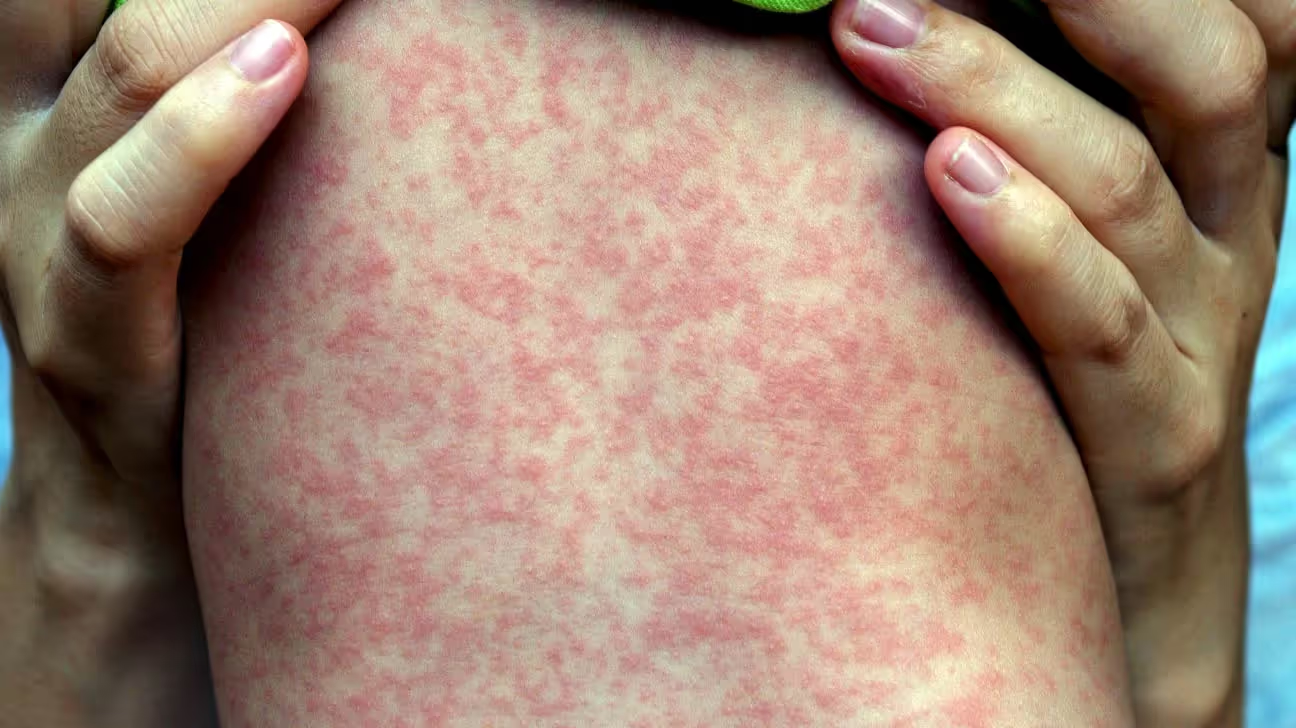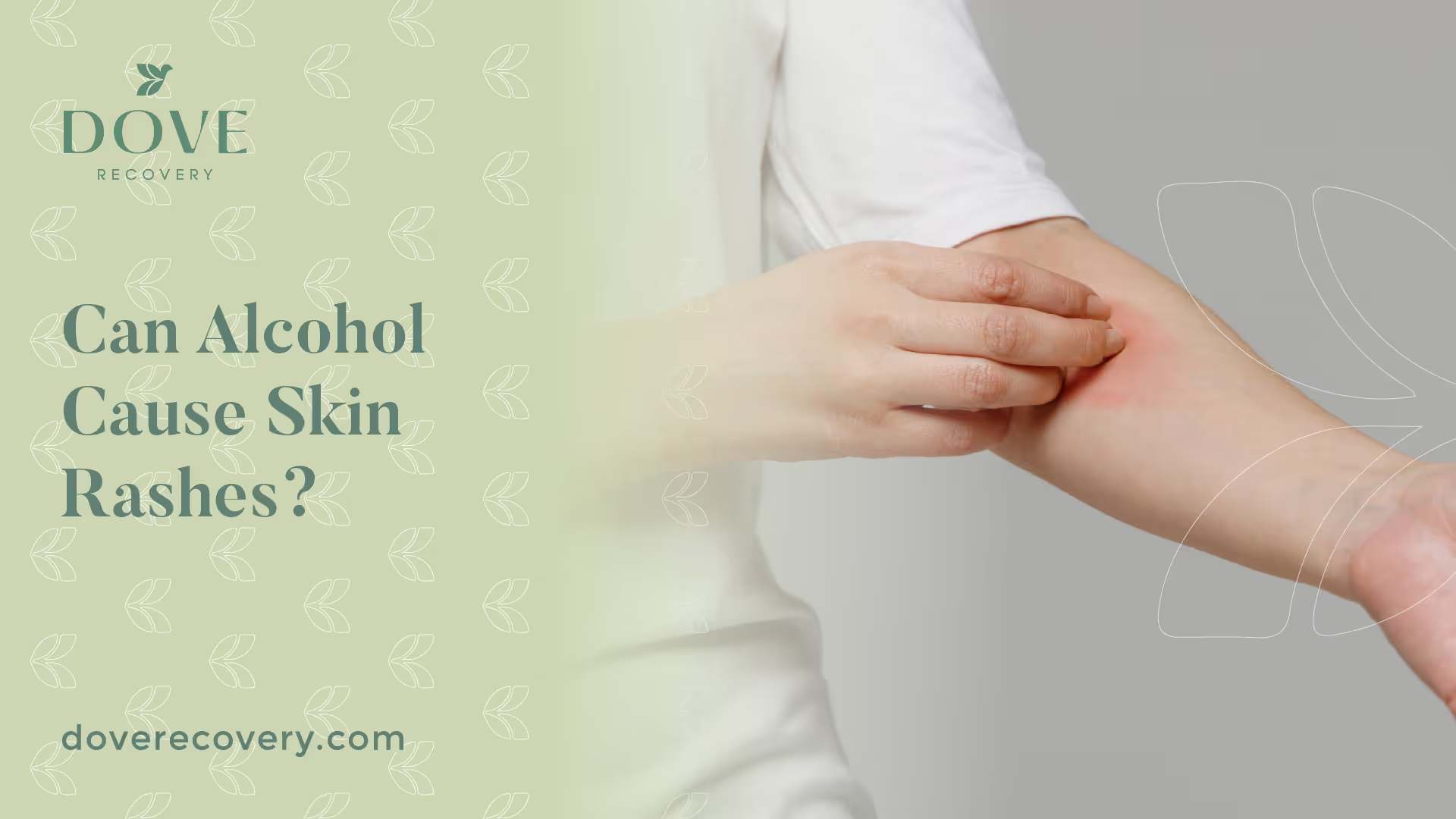Can Alcohol Cause Skin Rashes?

Can Alcohol Cause Skin Rashes?
Alcohol is a beloved social lubricant that we enjoy in many different forms, from beer to wine to cocktails. And while it can help us relax and unwind after a long day, it can also have some negative effects on our bodies, including rashes.

So, can alcohol cause rashes? The answer is yes, it can. Alcohol can cause a variety of skin reactions, including rashes, hives, and flushing. Let's take a closer look at how alcohol can impact your skin.
How Alcohol Causes Skin Rashes
Here's a revised version of the text with a bullet-pointed list of causes:
- Dehydration: Alcohol can dehydrate your skin, leading to itching, redness, and flakiness. This is especially common in people who drink heavily or who have a history of dry skin.
- Allergic reaction: Alcohol can cause an allergic reaction in some people, which can manifest as a rash. This is more likely to happen if you have an existing allergy to a specific type of alcohol, such as beer or wine.
- Alcohol-induced urticaria: Some people may experience a condition known as alcohol-induced urticaria, which is a type of hives that is triggered by alcohol consumption. This condition is more common in people who have a history of allergies or hives.
Note that these three causes are not mutually exclusive, and it's possible for someone to experience more than one of them at the same time.
Common Types of Alcohol that Can Cause Skin Rashes
While any type of alcohol has the potential to cause skin rashes, some are more likely to trigger a reaction than others. Here are a few examples:
Red wine
This is one of the most common culprits when it comes to alcohol-induced rashes. Red wine contains histamine, which can cause flushing and itching in some people.
Beer
Beer is another type of alcohol that can trigger an allergic reaction. Some people have a sensitivity to hops or barley, two common ingredients in beer.
Spirits
Hard liquors like whiskey, vodka, and gin are less likely to cause rashes than wine or beer, but they can still be problematic for some people. In particular, darker spirits like whiskey and rum may contain congeners (impurities) that can cause flushing and headaches.
It's worth noting that everyone's body reacts differently to different types of alcohol, so what triggers a rash in one person may not affect another person at all. If you notice that you tend to experience rashes after drinking a certain type of alcohol, it may be worth avoiding it in the future.
Allergic Reaction vs Dehydration
It can be difficult to determine whether a skin rash is caused by an allergic reaction or dehydration. Here are some tips to help you differentiate between the two:
Allergic Reaction
- An allergic reaction usually occurs shortly after drinking alcohol, while a rash caused by dehydration may take longer to appear.
- Allergic reactions tend to be more severe and can include symptoms like difficulty breathing, swelling of the face and throat, and dizziness.
- If you have a history of allergies or have experienced an allergic reaction before, it's more likely that your rash is caused by an allergy.
Dehydration
- A rash caused by dehydration is often accompanied by other symptoms of dehydration, such as dry mouth, thirst, and fatigue.
- The rash may appear in areas where sweat accumulates, such as under the arms or on the back.
- Applying moisturizer to the affected area can help soothe the skin and reduce itching.
If you're unsure what's causing your skin rash, it's always a good idea to consult with a healthcare professional. They can help determine whether your rash is related to alcohol consumption or if there's another underlying cause that needs attention.
Other Skin Reactions Caused by Alcohol Consumption

In addition to rashes, alcohol consumption can also lead to other skin reactions. Here are a few examples:
Acne
Alcohol consumption can trigger acne breakouts in some people. This is because alcohol can increase inflammation in the body and disrupt hormone levels, both of which can contribute to acne.
Rosacea
Rosacea is a skin condition that causes redness and flushing on the face. While the exact cause of rosacea is unknown, alcohol consumption is thought to be a trigger for many people with the condition.
Eczema
Eczema is a chronic skin condition characterized by dry, itchy patches on the skin. While alcohol consumption doesn't directly cause eczema, it can worsen existing symptoms and trigger flare-ups in some people.
It's important to note that everyone's body reacts differently to alcohol, so not everyone will experience these types of skin reactions. However, if you notice that your skin tends to react negatively after drinking alcohol, it may be worth reducing your intake or avoiding alcohol altogether.
How to Prevent Alcohol-Induced Rashes Before They Occur
Prevention is always the best course of action, especially when it comes to skin reactions caused by alcohol consumption. Here are some tips to help you avoid rashes before they occur:
Stay Hydrated
One of the primary causes of alcohol-induced rashes is dehydration. To prevent this from happening, make sure you drink plenty of water before, during, and after drinking alcohol. This will help keep your skin hydrated and reduce the likelihood of itching, redness, and flakiness.
Know Your Triggers
As mentioned earlier, certain types of alcohol are more likely to cause rashes than others. If you know that you're sensitive to a particular type of alcohol, such as red wine or beer, it's best to avoid it altogether.
Take Antihistamines
If you're prone to allergic reactions or have experienced rashes in the past after drinking alcohol, consider taking an antihistamine before consuming any alcoholic beverages. This can help prevent an allergic reaction from occurring and reduce the likelihood of developing a rash.
Moisturize Your Skin
Applying moisturizer to your skin before drinking alcohol can help create a barrier between your skin and the dehydrating effects of alcohol. This can go a long way in preventing rashes from occurring.
Limit Your Alcohol Intake
Finally, one of the most effective ways to prevent alcohol-induced rashes is simply to limit your intake. Drinking in moderation can help reduce the likelihood of developing a rash or other skin reaction.
By following these tips, you can enjoy your favorite alcoholic beverages without having to worry about negative skin reactions. However, if you do experience a rash despite taking preventative measures, it's important to seek medical attention as soon as possible. A healthcare professional can help determine the underlying cause and provide appropriate treatment.
Identifying if Your Rash is Due to an Underlying Medical Condition
While alcohol consumption can certainly cause skin rashes, it's important to be aware that there are other medical conditions that can also cause rashes. If you're experiencing a rash and aren't sure whether it's related to alcohol consumption or something else entirely, here are some signs to look for:
- Location of the rash: Certain medical conditions tend to cause rashes in specific areas of the body. For example, eczema often affects the hands and feet, while rosacea is typically found on the face. If your rash appears in an unusual location or spreads quickly, it may be a sign of an underlying medical condition.
- Severity of the rash: Alcohol-induced rashes tend to be mild to moderate in severity and may disappear on their own within a few days. If your rash is severe or doesn't improve over time, it may be a sign of a more serious medical condition.
- Accompanying symptoms: In addition to the rash itself, many medical conditions also cause other symptoms like fever, fatigue, and joint pain. If you're experiencing any additional symptoms along with your rash, it's worth consulting with a healthcare professional.
If you suspect that your skin rash may be caused by an underlying medical condition rather than just from drinking alcohol, it's important to seek medical attention as soon as possible. A healthcare professional can help determine the underlying cause and provide appropriate treatment.
Treating Alcohol-Induced Rashes
If you experience a rash after drinking alcohol, there are a few things you can do to alleviate your symptoms. First, try to stay hydrated by drinking plenty of water before and after drinking alcohol. This can help combat the dehydration that can lead to skin irritation.
You may also want to avoid drinking alcohol altogether if you notice that it consistently causes rashes or other skin reactions. If you do choose to drink, try switching to a different type of alcohol to see if that helps. For example, some people may be allergic to beer but not wine, or vice versa.
If your rash is particularly severe or does not go away after a few days, you should speak to a healthcare provider. They can recommend over-the-counter or prescription medications to help alleviate your symptoms.
Topical Treatments for Alcohol-Induced Rashes
While prevention is always the best course of action, sometimes rashes caused by alcohol consumption can still occur. If you find yourself dealing with an alcohol-induced rash, topical treatments can help alleviate your symptoms and speed up the healing process.
Here are a few examples of topical treatments that may be effective for alcohol-induced rashes:
Aloe Vera
Aloe vera is a natural anti-inflammatory and moisturizer that can help soothe irritated skin. Applying aloe vera gel to the affected area can help reduce redness, itching, and inflammation.
Oatmeal Baths
Soaking in an oatmeal bath can also be helpful for soothing itchy or irritated skin. Oats contain compounds called avenanthramides, which have anti-inflammatory properties.
Hydrocortisone Cream
If your rash is particularly severe or uncomfortable, you may want to consider using a hydrocortisone cream. This type of cream contains steroids that can help reduce inflammation and itching.
Calamine Lotion
Calamine lotion is another option for soothing irritated skin. It contains zinc oxide, which has a cooling effect on the skin and can help reduce redness and inflammation.
It's worth noting that while these topical treatments may be effective for alcohol-induced rashes, they may not work for everyone. Additionally, if your rash is severe or does not improve after several days of treatment, it's important to seek medical attention from a healthcare professional who can provide appropriate treatment.
Conclusion
In conclusion, alcohol can cause rashes in some people, particularly those who have a history of dry skin, allergies, or hives. If you experience a rash after drinking alcohol, try to stay hydrated and consider switching to a different type of alcohol. If your symptoms persist, speak to a healthcare provider.
Sources:
- Alcohol flush reaction: https://www.medicalnewstoday.com/articles/alcohol-flush-reaction
- Alcohol-induced urticaria: https://dermnetnz.org/topics/alcohol-induced-urticaria/
